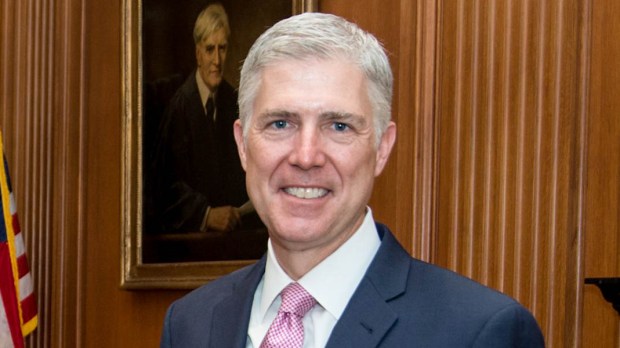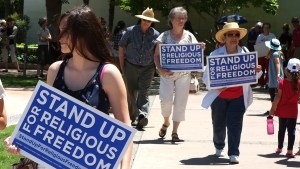Lenten Campaign 2025
This content is free of charge, as are all our articles.
Support us with a donation that is tax-deductible and enable us to continue to reach millions of readers.
Can a local government make a decision involving Church doctrine to determine whether or not a particular religious organization is eligible for tax exemption? The Supreme Court of the United States seems to think it can, but one member vehemently disagrees.
Dissenting from a Tuesday decision not to review a Virginia Presbyterian church’s dispute with a city government, Justice Neil Gorsuch blasted colleagues for failing to see the constitutional implications of the dispute.
“The First Amendment does not permit bureaucrats or judges to ‘subject’ religious beliefs ‘to verification,’” Gorsuch wrote in his dissent. He said that he would have accepted the case and voted on the side of the church.
The case began when the New Life in Christ Church in Fredericksburg, Virginia, claimed a tax exemption for a residence occupied by Josh and Anacari Storms. Hired as youth ministers, the couple was responsible for providing leadership over the church’s ministry to college students “through godly example, prayer, leadership development, collegiate community engagement, program management and administrative oversight,” according to the church’s appeal to the Supreme Court. The couple’s duties included leading Bible study meetings, providing discipleship to each member of the college ministry, developing and managing a budget for the ministry activities, and executing ministry vision and goals. For their work, the Storms received a yearly salary from the church.
The City of Fredericksburg sought to deny the church’s tax exemption, and years of litigation ensued. A state trial court ruled in the city’s favor, and the Virginia Supreme Court turned down the church’s appeal. Even after the church took their case to the Supreme Court, the city continued to insist that a church’s religious rules are “subject to verification” by government officials.
Both parties in the dispute accept that, under state law, a church may claim a “ministerial” residence exempt from taxes and that state law does not supply a definition for the term “minister.” Instead, whether a person qualifies as a “minister” varies across “different religious denominations or traditions” and “depends on the organizational policies of the organization.”
But the city argued that the church is not entitled to a tax credit because it misunderstands who qualifies as “minister” in its own faith tradition. The City asked the church questions such as whether church “doctrine and/or polity” permits Anacari Storms “to be ordained” given that she is a woman. Ultimately, the city argued that the church is “governed by the Book of Church Order of the Presbyterian Church in America” and that the “Book of Church Order utilizes the term ‘minister’ in contexts that make it clear that the term refers to a duly ordained person with specific leadership duties.” The Storms failed this test, the city argued, because they had “not been ordained” and are not listed as a “Lead Pastor, Associate Pastor, or Assistant Pastor” on the congregation’s website.
Many precedents
The church tried to explain that the city misunderstood its traditions and practices. The church responded that, yes, women can and do serve as ministers. It acknowledged that “in order to deliver sermons” a minister in its tradition must be ordained, but nothing in its rules or the Book of Church Order “prohibits a particular church from hiring ministers to serve as messengers and teachers of the faith” without ordination. Instead, the church explained its understanding that “Section 12 of the Book of Church Order provides each church rather broad authority to govern its own affairs, which includes “the ability to hire ministers to cater to specialized groups, such as youth.”
Gorshuch pointed out that the Supreme Court has said “plainly and consistently for many years” that the Constitution “does not permit bureaucrats or judges to ‘subject’ religious beliefs to verification. For example, in the 1976 case Serbian Eastern Orthodox Diocese for United States and Canada v. Milivojevich, the high court overturned a state court, which conducted a “‘detailed review’” before determining that a church’s decision was “‘not in accordance with the prescribed procedure of the constitution and the penal code of the Serbian Orthodox Church.’” The ruling explained that such governmental intrusions into ecclesiastical questions are “impermissible.” Unless there is proof of insincerity or fraud, a church’s decisions “‘on matters purely ecclesiastical, although affecting civil rights, are accepted in litigation before the secular courts as conclusive,’” the 1976 case said.
Gorsuch also cited the 2020 case Our Lady of Guadalupe School v. Morrissey-Berru, which said that when a school with a religious mission entrusts a teacher with the responsibility of educating and forming students in the faith, judicial intervention into disputes between the school and the teacher threatens the school’s independence in a way that the First Amendment does not allow.
”The Framers of our Constitution were acutely aware how governments in Europe had sought to control and manipulate religious practices and churches,” Gorsuch wrote in his dissent. “They resolved that America would be different. In this country, we would not subscribe to the ‘arrogant pretension’ that secular officials may serve as ‘competent Judge[s] of Religious truth,’” he wrote, quoting from a 2006 study of James Madison. “Instead, religious persons would enjoy the right ‘to decide for themselves, free from state interference, matters of . . . faith and doctrine,’” he concluded, citing the 1952 case Kedroff v. Saint Nicholas Cathedral of Russian Orthodox Church in North America.
“This case may be a small one, and one can hope that the error here is so obvious it is unlikely to be repeated anytime soon. But I would correct it,” Gorsuch wrote. “Bureaucratic efforts to ‘subject’ religious beliefs to ‘verification’ have no place in a free country.”


